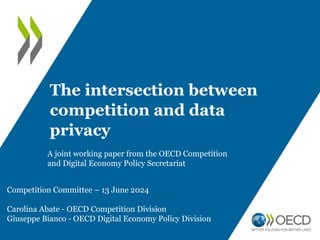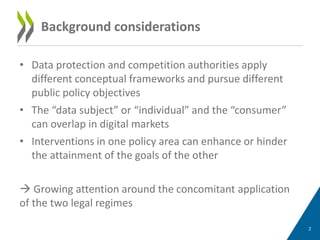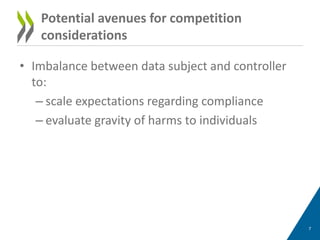The Intersection between Competition and Data Privacy тАУ OECD тАУ June 2024 OECD discussion
- 1. The intersection between competition and data privacy Competition Committee тАУ 13 June 2024 Carolina Abate - OECD Competition Division Giuseppe Bianco - OECD Digital Economy Policy Division A joint working paper from the OECD Competition and Digital Economy Policy Secretariat
- 2. тАв Data protection and competition authorities apply different conceptual frameworks and pursue different public policy objectives тАв The тАЬdata subjectтАЭ or тАЬindividualтАЭ and the тАЬconsumerтАЭ can overlap in digital markets тАв Interventions in one policy area can enhance or hinder the attainment of the goals of the other яГа Growing attention around the concomitant application of the two legal regimes 2 Background considerations
- 3. тАв Historical inclination to keep competition law and data privacy as two separate realms тАв Shift towards seeing collection and sharing of consumer data as a concern relevant for competition in some jurisdictions тАв Data privacy may constitute a component of quality, on which companies can compete тАв This reflects broader emerging considerations on quality and consumer choice in digital markets 3 Is data privacy an antitrust concern?
- 4. тАв The notion that ensuring effective price competition would naturally address other dimensions of competition has flaws тАв If certain non-price parameters are not explicitly considered, potential risk of harming competition on those specific parameters (e.g. data privacy) 4 Integrationist approach in digital markets тАЬIntegrationist approachтАЭ - data privacy has a role in competition assessments, as a non-price parameter of competition that can affect consumer welfare
- 5. тАв Companies that do not directly compete on data privacy but build their business models and their market power on data яГа data as an essential factor to compete 5 The interplay Competition authoritiesтАЩ interventions can influence data privacy Data protection authoritiesтАЩ actions can enhance/hamper competition Concern around companiesтАЩ handling of data
- 6. 6 Is competition a data privacy law concern? Different points of departure Data privacy law: potentially less open to incorporating market considerations
- 7. тАв Imbalance between data subject and controller to: тАУ scale expectations regarding compliance тАУ evaluate gravity of harms to individuals 7 Potential avenues for competition considerations
- 8. 8 Data privacy as a competitive advantage Benchmarks for rightsтАЩ effectiveness Withdrawal of consent A competitive market for privacy-enhancing technologies Actions by data protection authorities
- 9. 9 Complementarities and potential challenges Data-related measures, such as data portability, interoperability or data access, can have divergent effects on competition and data privacy Should competition agencies actively pursue antitrust remedies that are the most data privacy enhancing? Should data protection authorities prioritise measures that promote competition?
- 10. 10 Concluding remarks Need for mutual understanding of the respective priorities and ways of working, sharing expertise and resources, to better appraise: the functioning of new business models the issues on which each community should focus to achieve common goals in digital markets In the long term, effective cross-regulatory co-operation is paramount
- 11. THANK YOU











